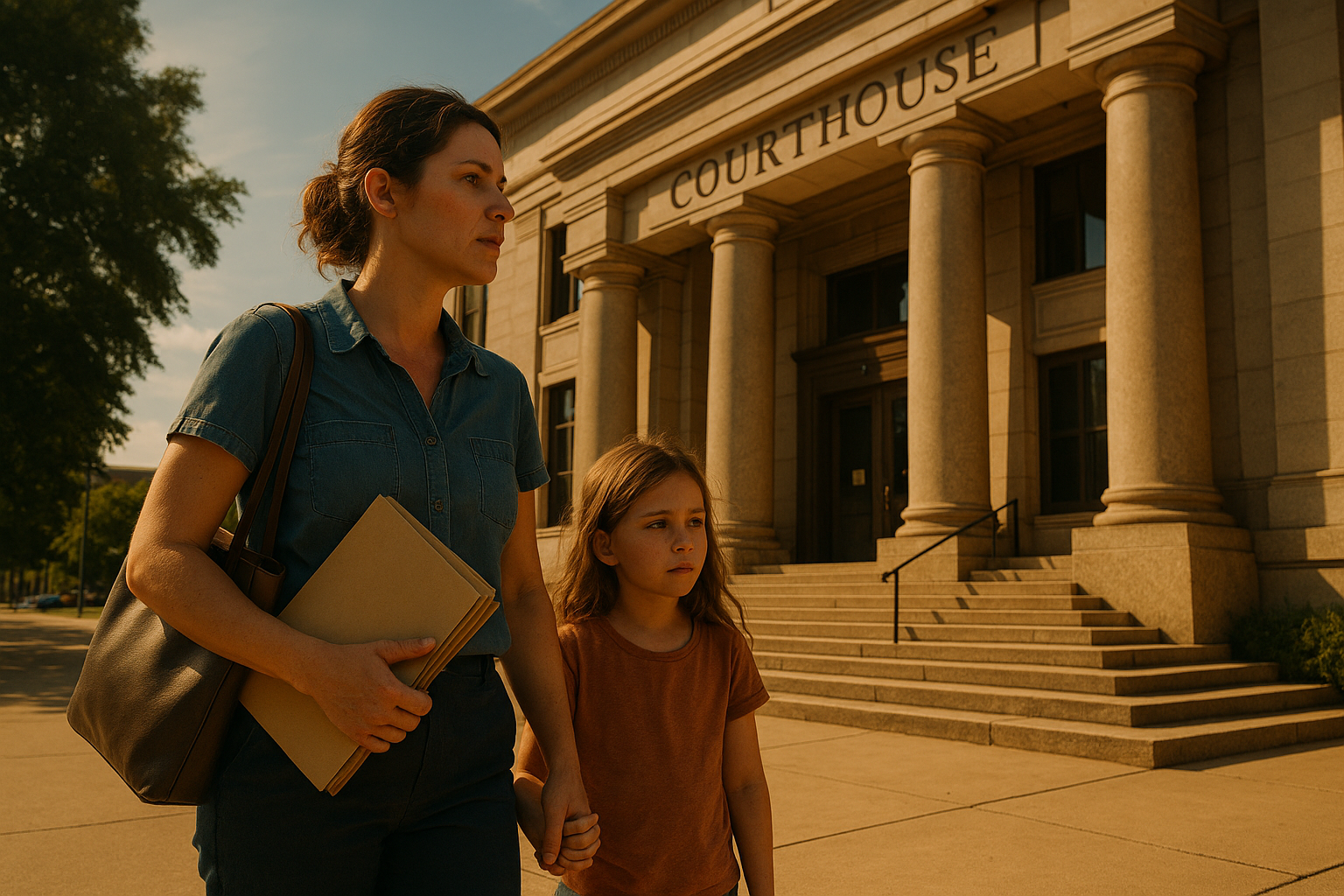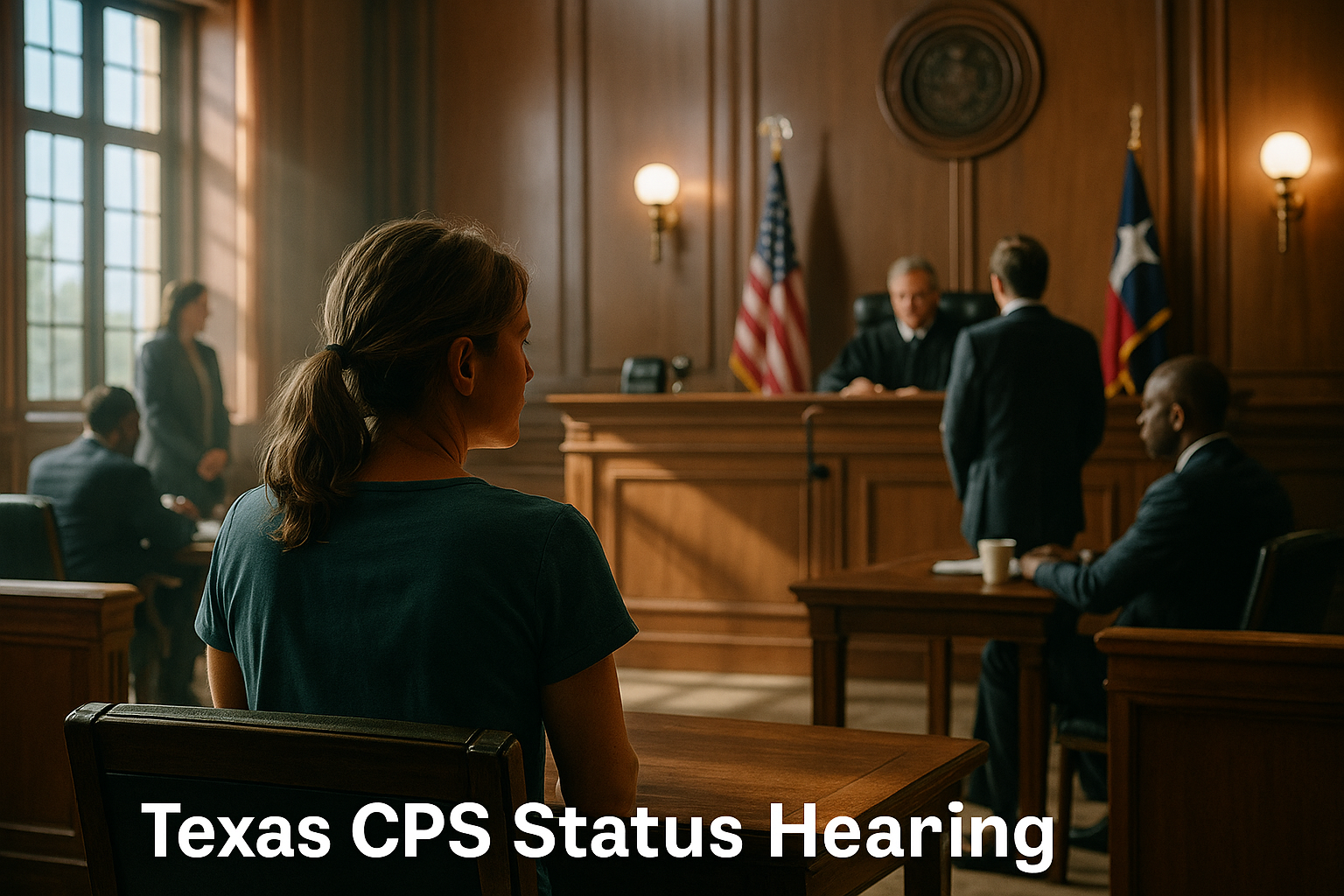
Ever been caught off guard by a knock on the door, only to find a CPS investigator standing on your porch? Maybe you were folding laundry, helping your child with homework, or just trying to get dinner on the table—and suddenly, your day takes a hard left turn. If you’ve been there (or fear you might be), you’re not alone, and we’re here to help you figure out how to ANSWER Texas CPS questions in an Interview without panicking or saying something that could be misunderstood.
This blog is your guide to staying calm, protecting your rights, and navigating a CPS interview with confidence. We’ll cover everything from what triggers a CPS visit, what kinds of questions they ask, and how your answers could be used later in court. You’ll also learn how to prepare the right documents, protect your children’s emotional health, and understand the legal protections available to you under Texas law.
The truth is, a CPS interview doesn’t have to be scary—especially when you know what to expect. Stick with us, and you’ll get practical, plain-English advice from the experienced family law attorneys at The Law Office of Bryan Fagan, PLLC. Because when your family’s future is on the line, you deserve guidance that’s compassionate, clear, and rooted in real-world experience. Let’s get started.
Key Takeaways
- CPS interviews assess the child’s living conditions and parenting behaviors to ensure their safety and well-being.
- Parents have legal rights during CPS interviews, including the right to legal representation and the ability to challenge evidence presented by CPS.
- Preparation and honest communication are crucial, as responses in CPS interviews can significantly impact legal proceedings and the outcome for families.

Your Family’s Future Starts Here
Don’t navigate your legal journey alone. Schedule a consultation now and get the clarity and support you deserve.
Understanding the Purpose of CPS Interviews
CPS interviews are a critical part of the state’s effort to ensure a child’s safety and well-being. As our family law team often explains, knowing how to ANSWER Texas CPS questions in an Interview is essential to protecting your parental rights and presenting your caregiving in a fair and accurate light. These interviews are intended to evaluate the child’s living environment, emotional support system, and any potential risks—without overstepping into unnecessary intrusion. Under Texas Family Code § 261.302, CPS is authorized to conduct in-person interviews as part of its broader investigation process, including talking directly to both parents and children.
Understanding the true purpose behind these interviews helps parents prepare more confidently. CPS isn’t just verifying allegations—they’re assessing your ability to meet your child’s physical, emotional, and educational needs. That’s why preparation matters. Bringing documentation, remaining calm, and knowing your legal rights can make all the difference. For additional insights, expert strategies, and case-based examples, check out this guide on navigating CPS interviews in Texas.
If you’re facing a CPS interview, don’t go in blind. Consider speaking with a knowledgeable attorney to ensure your voice is heard and your rights are respected. You can also learn more about how to protect yourself during a CPS investigation in our detailed breakdown of CPS procedures and legal protections. With the right support, your family can get through this with clarity, strength, and the peace of mind that comes from being prepared.
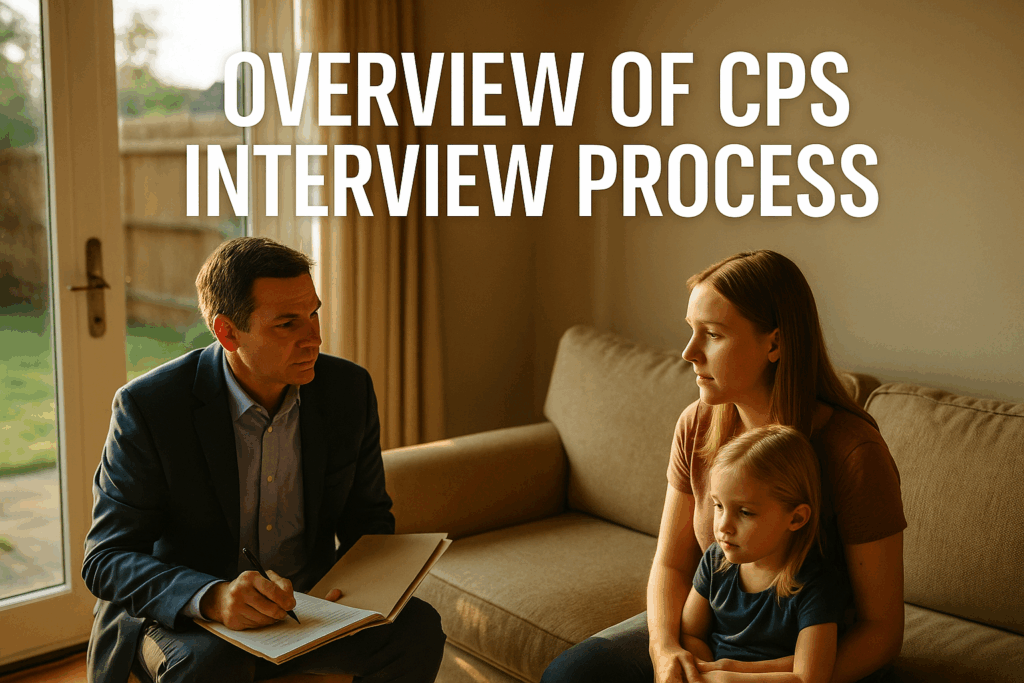
Common Goals of CPS Interviews
The primary goal of CPS interviews is to assess the living conditions of the child. This includes ensuring that the child has access to basic necessities such as food, clothing, and a safe shelter. Caseworkers also evaluate the home’s safety features, such as smoke detectors and childproofing measures, to ensure a secure environment.
Another key objective is to assess parenting behaviors and their impact on the child’s overall well-being. This involves looking at how discipline is administered and whether the parents’ methods are supportive and effective. These goals help CPS ensure children grow up in environments supportive of their health and development.
Legal Rights Parents Should Assert During CPS Interviews
During a CPS interview, understanding your rights under Texas law is not just helpful—it’s essential. According to Texas Family Code § 261.105, CPS must inform parents of the specific allegations being investigated. This legal requirement is key to helping parents understand why CPS is involved, what concerns are being addressed, and how to prepare for the discussion ahead. As our family law team often advises, knowing how to ANSWER Texas CPS questions in an Interview begins with knowing exactly what you’re responding to and why.
Parents also have the right to legal representation at every stage of the CPS process. You can choose to consult a private attorney or, in some cases, request a court-appointed one. While you technically can refuse to participate in a CPS interview unless there’s a court order compelling you, doing so without legal counsel could result in unintended consequences. A qualified family law attorney can help you avoid self-incrimination, provide context for your answers, and ensure your voice is clearly and accurately represented. For more insight into CPS practices and parental rights across Texas, explore this helpful breakdown of how the CPS system works in Dallas.
If you’re uncertain about how to move forward, don’t wait until things escalate. Our attorneys can guide you through every step, from interviews to hearings and beyond. For additional tips on protecting yourself during CPS involvement, visit our post on what to expect when CPS gets involved in your family law case. With the right strategy and legal support, you can navigate this process confidently and protect what matters most—your family’s future.

Key Legal Protections
Parents have several key legal protections during CPS interactions. CPS cannot conduct searches of a parent’s home without their consent or a proper court order. Privacy rights are safeguarded, requiring that interviews be conducted respectfully.
Additionally, parents have the right to challenge the evidence presented by CPS during investigations and hearings. Expert legal representation is crucial in these cases, as it helps parents understand their rights and navigate the complex legal landscape surrounding child welfare. Legal professionals can ensure that parents do not unintentionally compromise their case.
Common Types of CPS Interview Questions
Knowing the types of questions asked during a CPS interview helps parents prepare effectively. CPS interview questions typically focus on the child’s living environment, well-being, and any allegations of abuse or neglect. Anticipating these questions allows parents to gather relevant information and provide clear, accurate responses.
Questions About Child’s Living Environment
CPS caseworkers will inquire about the child’s living environment to ensure that it meets basic safety and hygiene standards. They may ask about the availability of food, clothing, and suitable shelter. Furthermore, questions might focus on the safety features within the home, such as smoke detectors and childproofing measures, as part of Child Protective Services CPS. CPS workers may also be involved in this assessment.
These questions aim to assess if the house environment is conducive to the child’s safety and well-being. Parents should be prepared to discuss the cleanliness and overall physical condition of their home, as well as any measures taken to ensure the child’s safety.
Questions About Child’s Well-being
Questions about the child’s well-being are crucial in evaluating whether parents are providing adequate emotional support. CPS may ask about the child’s emotional health and how parents address any psychological issues. The caseworker will also assess if the child feels safe and supported in their home environment.
Parents should be ready to discuss how they support their child’s emotional needs and ensure their overall well-being, as a parent. Kids should also be included in these discussions.
Questions About Allegations of Abuse or Neglect
CPS interviews often include direct questions about any previous allegations of child abuse or neglect. Investigators will seek detailed explanations regarding these accusations and the caregiver’s responses. These questions are designed to gather comprehensive information to assess the safety and well-being of the child.
Understanding the nature of these specific questions helps caregivers prepare and explain taking care of answered concerns raised and determine how to respond appropriately to concern.
Preparing for a CPS Interview
Preparation is one of the most powerful tools a parent can bring to a CPS interview. According to the attorneys at our firm, parents who understand the process outlined in Texas Family Code § 261.302—which governs the investigation and interview procedures—are better equipped to anticipate the kinds of questions that may arise and to respond with clarity and composure. Knowing how to ANSWER Texas CPS questions in an Interview is about more than just telling your side of the story; it’s about presenting yourself as a stable, informed, and cooperative caregiver from the very first moment.
The early moments of a CPS interview often set the tone for the rest of the case. By maintaining a calm and respectful demeanor, parents can help reduce the adversarial nature of the investigation and build a more productive rapport with the caseworker. Simple techniques such as deep breathing, preparing key documents ahead of time, and focusing solely on the questions being asked can make a meaningful difference. We encourage families to review this comprehensive resource on how to prepare for a Texas CPS status hearing for additional insights into preparation strategies that apply both before and after the interview.
If you’re looking for even more in-depth support, our article on building a CPS defense strategy in high-conflict custody cases offers practical guidance on gathering evidence, protecting your rights, and keeping your family secure. With the right preparation and legal backing, parents can face a CPS interview with greater confidence and peace of mind.

Documenting Parenting Efforts
Documenting parenting efforts is crucial in providing evidence of a parent’s commitment to their child’s well-being. Keeping thorough records of medical visits, school attendance, and other relevant engagements can significantly impact CPS assessments.
Parents should maintain specific examples of records, such as vaccination records, school report cards, and letters from teachers or counselors. Diligent documentation reinforces parents’ roles as responsible caregivers.
Seeking Immediate Legal Counsel
Consulting with a family law attorney prior to a CPS interview is essential for understanding legal rights and preparing an effective response. Having a lawyer present during the interview can help ensure that parents understand their rights and make informed decisions.
Legal representation can also ensure that parents’ statements are articulated clearly and are not misinterpreted or taken out of context. This can help prevent self-incrimination and improve the overall outcome of the interview.
Staying Calm and Confident During the Interview
Being well-prepared for a CPS interview significantly enhances a parent’s ability to communicate effectively and defend their parenting practices. Familiarizing oneself with the CPS process and knowing what to expect during the interview can reduce anxiety.
Maintaining a calm demeanor during the interview is crucial for conveying confidence and credibility. Proper preparation can help you stay focused, reduce stress, stay calm, preserve family unity, and lead to better outcomes.
Techniques to Manage Stress
Mindfulness and relaxation techniques like deep breathing and meditation can alleviate emotional distress during a CPS investigation. Building a strong support network, including friends, family, and professional counselors, is also crucial for emotional resilience.
Physical activities, even simple exercises or walks, can significantly reduce stress and improve mood. Maintaining a routine and prioritizing self-care activities, such as a nutritious diet and quality sleep, are essential for managing stress during this challenging period.
Importance of Honest Communication
Honest communication is crucial during CPS interviews to ensure an accurate representation of facts and to avoid any potential false claims. Truthfulness can prevent complications in your case. Individuals should be cautious with their responses, as ambiguous answers might be interpreted as admissions of guilt.
Practicing clear and precise communication can help mitigate the risk of unintended self-incrimination.
Emotional Impact of CPS Investigations
CPS investigations can place tremendous emotional strain on parents and children alike. The uncertainty, fear, and disruption to daily life often leave families feeling overwhelmed and vulnerable. As our family law team has seen firsthand, even the most dedicated and loving parents may struggle under the weight of a CPS case. But when handled with the right preparation and legal guidance, many families do find their way to resolution—and experience profound relief and healing through reunification. Understanding how to ANSWER Texas CPS questions in an Interview is a crucial step in that journey, as clear, thoughtful communication early on can influence the entire course of the investigation.
Under Texas Family Code § 263.201, CPS is required to hold a status hearing within 60 days of a child’s removal, and this hearing becomes a pivotal checkpoint for families seeking reunification. Preparing emotionally for that hearing—and for the steps leading up to it—requires more than legal knowledge alone. Families benefit from support systems that include counseling, parenting resources, and advocacy. Our attorneys not only provide skilled legal representation but also connect clients with community-based support to help manage the emotional challenges of a CPS case. For a detailed look at what to expect, we recommend reviewing this trusted guide to understanding the Texas CPS status hearing.
Whether you’re early in the investigation or approaching your next court appearance, our firm is here to stand beside you. To explore additional tools that can support your legal and emotional preparation, read our article on coping with the CPS process during divorce. With compassionate counsel and a well-informed plan, you can begin to restore stability and protect what matters most—your family’s future.
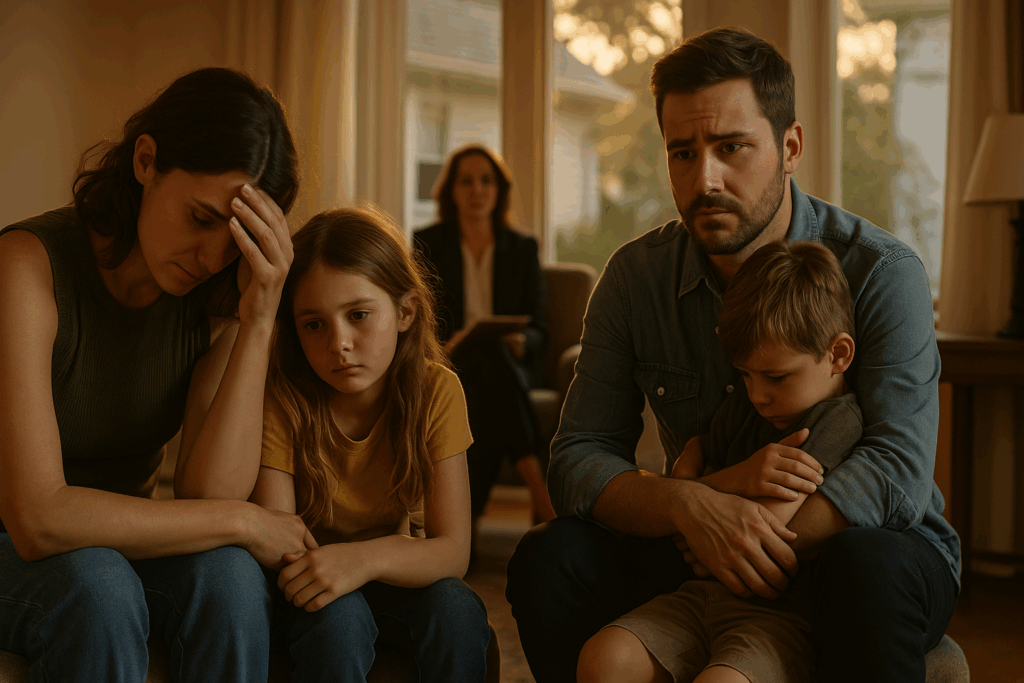
Coping Strategies for Families
Counseling can be an effective method for families to process the emotional implications of CPS interactions. Support groups provide a shared space for discussing experiences and developing coping strategies.
Engaging in community resources can help families build resilience and find practical support amidst the stress of CPS involvement. Combining counseling, community, and family resources creates a robust support system that helps families navigate the stress of CPS involvement effectively.
How Answers Can Be Used in Court
Answers provided during CPS interviews can be used in court, making it vital to respond cautiously and truthfully. CPS investigators often focus on specific details related to the allegations, which can resemble police interrogation tactics.
Maintaining thorough documentation of parenting activities, such as medical appointments and school attendance, can serve as crucial evidence during CPS evaluations. Honest and accurate responses are essential, as inconsistencies can undermine credibility.
Avoiding Unintentional Incrimination
Parents must understand their legal rights during CPS interviews, including the right to remain silent and the right to legal representation. Preparing for the interview includes gathering necessary documents and understanding the nature of the questions that may be asked.
Honest communication is essential, but parents should think carefully about their responses to avoid misinterpretations that could lead to self-incrimination. Consulting with an attorney before answering questions can help prevent unintentional harm to their case.
Real-life Scenarios and Testimonials
Incorporating real-life scenarios and testimonials can provide valuable insights into successfully navigating CPS cases. Families often reunite after addressing issues such as substance abuse and mental health through various support services, creating a story of resilience and recovery.
The success of family reunification often hinges on the commitment of parents to engage in required programs and therapies. These testimonials highlight the importance of cooperation and legal counsel in achieving positive outcomes.
Success Stories
Success stories offer hope and encouragement for families navigating CPS cases. One notable example involved a family where the parents actively worked on suggested improvements and underwent counseling, resulting in their children being returned to their custody. These stories show that with the right support and commitment, families can overcome the challenges posed by CPS investigations.
Legal counsel played a critical role in guiding these families through the CPS process, ensuring their rights were protected and facilitating communication with agency officials. Through collaboration with social workers and legal professionals, many families have experienced positive outcomes, leading to reunifications and improved family dynamics.
The Role of Attorneys at the Law Office of Bryan Fagan PLLC
The attorneys at the Law Office of Bryan Fagan PLLC play an essential role in protecting parental rights during CPS processes. Experienced attorneys provide critical support by preparing clients for CPS interviews and ensuring their parental rights are safeguarded. Families have reported successful experiences of overcoming CPS challenges by engaging legal counsel, which has helped them navigate complex situations and achieve positive outcomes.
Overall, having legal support during CPS investigations is vital, as attorneys advocate for parents and guide them through every step of the process. The firm offers tailored legal representation that includes step-by-step preparation strategies for CPS interviews.
Comprehensive Support Services
The Law Office of Bryan Fagan PLLC offers extensive legal services tailored to family law matters, ensuring clients receive holistic support. Preparation strategies provided by the firm include mock interviews and personalized coaching sessions for clients facing CPS inquiries.
Preparation for court involves not only gathering evidence but also strategizing how to effectively present a case in courts. This comprehensive support ensures that clients are well-prepared to face CPS interviews and any subsequent legal proceedings.
Connection Between CPS Interviews and Broader Family Law Concerns
CPS interviews rarely happen in isolation—they often overlap with significant family law issues like custody disputes, termination of parental rights, and court-ordered reunification efforts. According to Texas Family Code § 153.002, all decisions involving children must prioritize the best interest of the child, and that includes how CPS investigations are handled. Statements made during an interview with a caseworker can later be introduced as evidence in custody hearings or other legal proceedings, which is why knowing how to ANSWER Texas CPS questions in an Interview is so critical.
As the attorneys at our firm emphasize, every response you give during a CPS interview can carry long-term consequences, even if it seems harmless in the moment. Whether you’re working toward reunification or defending your rights in an ongoing custody battle, your words and demeanor will help shape the narrative. That’s why we encourage parents to view these interviews not just as part of a CPS inquiry, but as pivotal moments in their broader legal journey. To get answers to common concerns, we recommend reviewing this helpful Texas CPS FAQ page for practical legal insight grounded in real-world experience.
If you’re currently navigating both CPS and family court, you’re not alone—and you’re not without options. For more on how these processes intersect, check out our post on how CPS involvement affects child custody cases. With trusted legal guidance and a proactive strategy, you can approach both CPS interviews and court proceedings with clarity, confidence, and a firm grip on your rights.
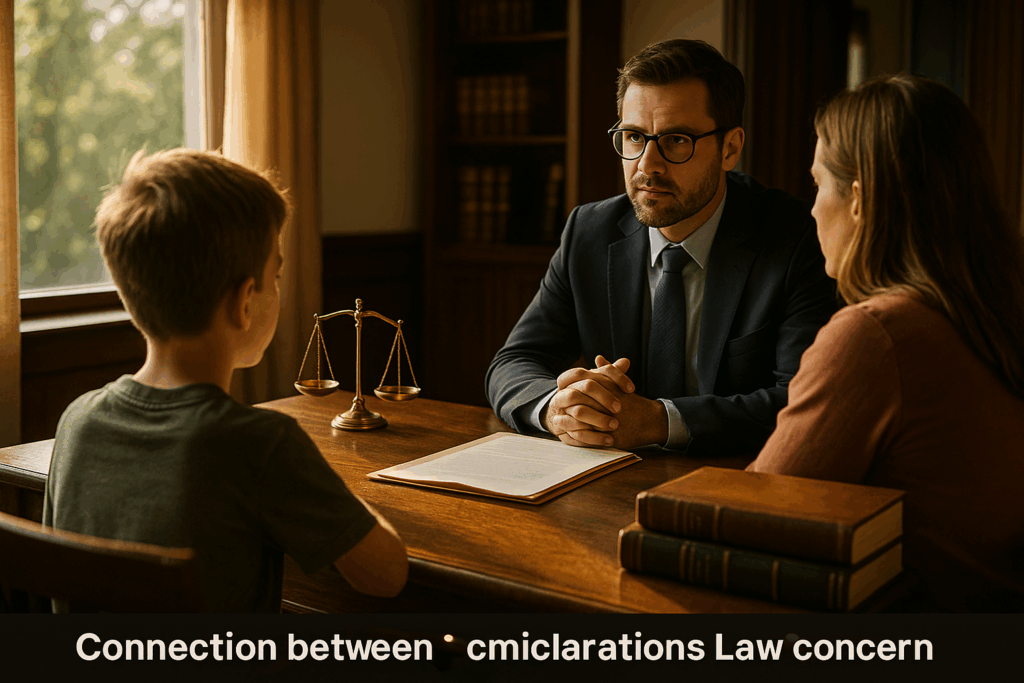
Navigating Family Law Challenges
Navigating family law challenges, especially during CPS interviews, is a complex process that requires legal guidance to protect parental rights. Experienced attorneys provide crucial assistance in preparing clients for CPS interviews, ensuring they are informed about their legal rights to judge the situation effectively.
The Law Office of Bryan Fagan PLLC offers comprehensive support services, including representation, to help families navigate CPS proceedings effectively. This support is essential for achieving positive outcomes and ensuring that parental rights are upheld.
Conclusion:
If you’ve made it this far, give yourself some credit—seriously. Facing a CPS interview isn’t easy, and the fact that you’re taking the time to learn, prepare, and protect your family says a lot about you. Navigating how to answer CPS questions in Texas isn’t just about getting through the moment—it’s about making smart choices that safeguard your rights, your children, and your peace of mind.
Remember, you don’t have to do this alone. Whether you’re in the early stages of a CPS investigation or already knee-deep in questions, the team at The Law Office of Bryan Fagan, PLLC is here to support you with real guidance, not generic advice. Our attorneys are deeply familiar with Texas CPS procedures, and we know how to build a strategy that puts your family first.
So take a deep breath, maybe jot down a few notes, and when you’re ready—reach out. We’ll help you prepare, stay calm, and face the process with confidence. After all, protecting your family’s future isn’t just our job. It’s our mission.
And hey—next time someone knocks at the door unexpectedly, may it be the pizza guy and not a caseworker.
Frequently Asked Questions – Texas CPS Interviews
What does CPS look for in an interview?
CPS looks for signs of child safety, emotional and physical well-being, and whether the home environment meets basic standards of care. They assess parenting behaviors, responses to discipline, and consistency in meeting a child’s needs.
How to answer a child protection question in an interview?
Answer honestly, clearly, and calmly. Avoid speculation or emotional outbursts, and stick to facts. It’s best to consult a family law attorney before the interview to ensure your rights are protected.
How do you answer CPS questions?
You should answer CPS questions with short, truthful statements. Do not volunteer unnecessary information. Ask to clarify questions if needed, and involve a lawyer to help guide your responses.
What questions are asked during a child neglect interview?
CPS may ask about the child’s daily routine, availability of food and clothing, discipline methods, who supervises the child, and how medical or educational needs are handled.
What are the five criteria for CPS?
The five general criteria CPS considers are: the child’s safety, the severity of allegations, parental response, risk of future harm, and the overall well-being of the child.
How long does a CPS interview take?
A CPS interview typically lasts between 30 minutes to 2 hours, depending on the complexity of the case, the number of people involved, and the nature of the allegations.
How do you answer case questions in an interview?
Use a structured approach: clarify the question, explain your thought process, support your answer with facts or examples, and stay composed. Legal cases require calm, factual reasoning.
What are the 5 R’s of safeguarding?
The 5 R’s of safeguarding are: Recognize, Respond, Report, Record, and Refer. These steps help ensure a timely and appropriate reaction to concerns about a child’s welfare.
What is a weakness for a childcare interview?
A common weakness might be difficulty managing large groups or limited experience with special needs children. It’s best to be honest but follow up with how you’re actively improving that area.



